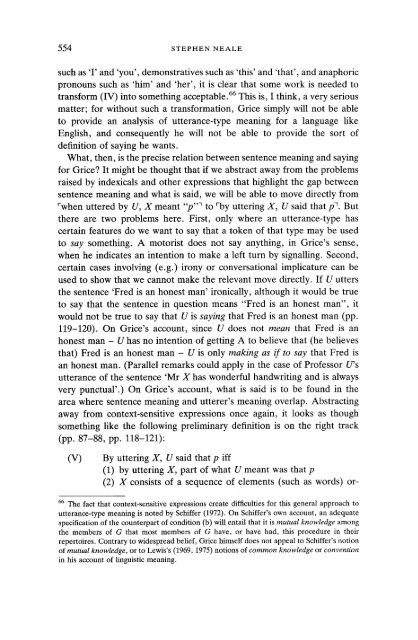Paul Grice and the philosophy of language
Paul Grice and the philosophy of language
Paul Grice and the philosophy of language
You also want an ePaper? Increase the reach of your titles
YUMPU automatically turns print PDFs into web optimized ePapers that Google loves.
554 STEPHEN NEALE<br />
such as T <strong>and</strong> 'you', demonstratives such as 'this' <strong>and</strong> 'that', <strong>and</strong> anaphoric<br />
pronouns such as 'him' <strong>and</strong> 'her', it is clear that some work is needed to<br />
transform (IV) into something acceptable. 66 This is, I think, a very serious<br />
matter; for without such a transformation, <strong>Grice</strong> simply will not be able<br />
to provide an analysis <strong>of</strong> utterance-type meaning for a <strong>language</strong> like<br />
English, <strong>and</strong> consequently he will not be able to provide <strong>the</strong> sort <strong>of</strong><br />
definition <strong>of</strong> saying he wants.<br />
What, <strong>the</strong>n, is <strong>the</strong> precise relation between sentence meaning <strong>and</strong> saying<br />
for Gfice It might be thought that if we abstract away from <strong>the</strong> problems<br />
raised by indexicals <strong>and</strong> o<strong>the</strong>r expressions that highlight <strong>the</strong> gap between<br />
sentence meaning <strong>and</strong> what is said, we will be able to move directly from<br />
rwhen uttered by U, X meant "p"" to ~by uttering X, U said that p'. But<br />
<strong>the</strong>re are two problems here. First, only where an utterance-type has<br />
certain features do we want to say that a token <strong>of</strong> that type may be used<br />
to say something. A motorist does not say anything, in <strong>Grice</strong>'s sense,<br />
when he indicates an intention to make a left turn by signalling. Second,<br />
certain cases involving (e.g.) irony or conversational implicature can be<br />
used to show that we cannot make <strong>the</strong> relevant move directly. If U utters<br />
<strong>the</strong> sentence 'Fred is an honest man' ironically, although it would be true<br />
to say that <strong>the</strong> sentence in question means "Fred is an honest man", it<br />
would not be true to say that U is saying that Fred is an honest man (pp.<br />
119-120). On <strong>Grice</strong>'s account, since U does not mean that Fred is an<br />
honest man - U has no intention <strong>of</strong> getting A to believe that (he believes<br />
that) Fred is an honest man - U is only making as if to say that Fred is<br />
an honest man. (Parallel remarks could apply in <strong>the</strong> case <strong>of</strong> Pr<strong>of</strong>essor U's<br />
utterance <strong>of</strong> <strong>the</strong> sentence 'Mr X has wonderful h<strong>and</strong>writing <strong>and</strong> is always<br />
very punctual'.) On <strong>Grice</strong>'s account, what is said is to be found in <strong>the</strong><br />
area where sentence meaning <strong>and</strong> utterer's meaning overlap. Abstracting<br />
away from context-sensitive expressions once again, it looks as though<br />
something like <strong>the</strong> following preliminary definition is on <strong>the</strong> right track<br />
(pp. 87-88, pp. 118-121):<br />
(v)<br />
By uttering X, U said that p iff<br />
(1) by uttering X, part <strong>of</strong> what U meant was that p<br />
(2) X consists <strong>of</strong> a sequence <strong>of</strong> elements (such as words) or-<br />
66 The fact that context-sensitive expressions create difficulties for this general approach to<br />
utterance-type meaning is noted by Schiffer (1972). On Schiffer's own account, an adequate<br />
specification <strong>of</strong> <strong>the</strong> counterpart <strong>of</strong> condition (b) will entail that it is mutual knowledge among<br />
<strong>the</strong> members <strong>of</strong> G that most members <strong>of</strong> G have, or have had, this procedure in <strong>the</strong>ir<br />
repertoires. Contrary to widespread belief, <strong>Grice</strong> himself does not appeal to Schiffer's notion<br />
<strong>of</strong> mutual knowledge, or to Lewis's (1969, 1975) notions <strong>of</strong> common knowledge or convention<br />
in his account <strong>of</strong> linguistic meaning.














